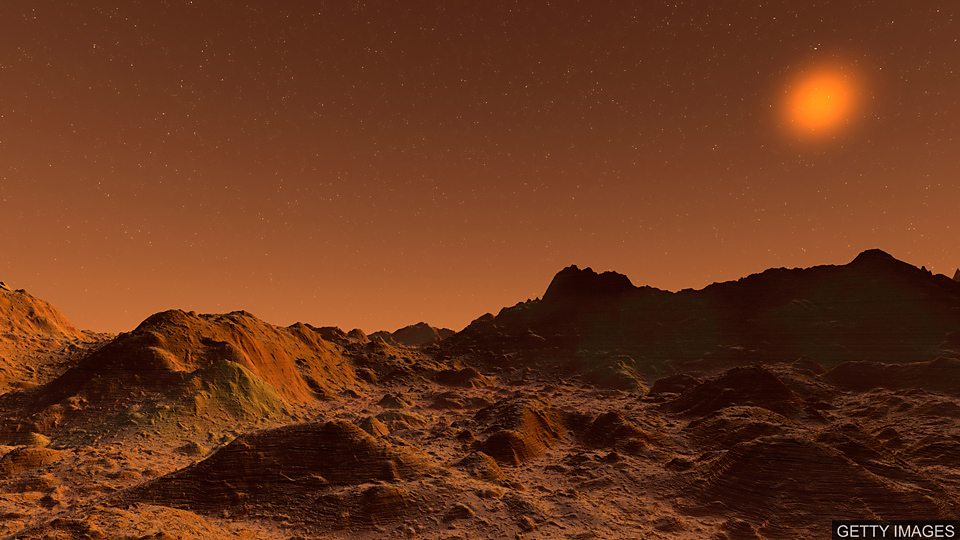火星一直是科幻小说的主题。关于火星上是否存在生命、水甚至文明的理论一直存在。现在,人类似乎离登陆火星的日子越来越近,但我们究竟为什么要去火星呢?
词汇:space exploration 太空探索
It sounds like something from the realms of science fiction – a space expedition into the vast expanse of space, heading towards the Red Planet. While we’re not quite ready to put a person on terra firma, the question we ask today is: why are so many countries interested in going to Mars?
The space race saw the USA and USSR compete to achieve firsts in spaceflight. The Soviet Union released Sputnik 1, an artificial satellite, before anyone else, and the US landed on the Moon first. Now it appears that Mars is the celestial body of desire. While the kudos and bragging rights to be the first nation to touchdown is an obvious draw, there are other reasons we want to get there.
One of these could be the survival of our species. You only have to look at the fossilised remains of the dinosaurs to see the benefit of finding another habitable planet. While Mars doesn’t have the right conditions to call it home just yet, there’s always the concept of terraforming – changing the environment of a planet to suit our needs.
However, not everyone agrees. Leading astrophysicist Neil deGrasse Tyson has said the concept of altering habitability of another planet because of the damage we have done to Earth makes no sense when we can simply terraform Earth.
It seems the main reason at the moment is the search for extraterrestrial life. It has long been believed that, at one time, Mars was abundant with life. Now seemingly dead, the potential fossils could answer questions about our own evolution and that of our planet. One theory is that bacterial life on our planet didn’t start here, but was transferred via asteroid from Mars.
One benefit championed by scientists like Neil deGrasse Tyson is that landing on Mars may inspire more people to become interested in science and astronomy. Surely inspiring a new generation to visit the stars is reason enough.
词汇表
science fiction 科幻小说
space expedition 宇宙探险
vast expanse 广阔的区域
the Red Planet 火星
terra firma 陆地
space race 太空竞赛
spaceflight 宇宙飞行
artificial satellite 人造卫星
celestial body 天体
touchdown 着陆
species 物种
habitable 适于居住的
terraforming (外星环境)地球化
astrophysicist 天体物理学家
habitability 可居住性
Earth 地球
extraterrestrial 地球外的
bacterial life 细菌生命体
asteroid 小行星
astronomy 天文学
测验与练习
1. 阅读课文并回答问题。
1. Which two countries were involved in the space race?
2. What was the purpose of the space race?
3. Why does Neil deGrasse Tyson think terraforming Mars makes no sense?
4. Where do some people think bacterial life on Earth originated?
5. What benefit of heading to Mars does Neil deGrasse Tyson support?
2. 选择意思恰当的单词或词组来完成下列句子。
1. Planets like Mars need to be _______ before they are habitable.
terraform terraformed terraforms terraforming
2. The _______ saw nations trying to achieve firsts in spaceflight.
space race asteroid Red Planet astronomy
3. I’m studying to be an _______ at university.
astronomy asteroid terra firma astrophysicist
4. We have _______. We have landed on the planet’s surface!
extraterrestrial touchdown celestial body asteroid
5. Mars is an example of a _______.
celestial body astronomy space race asteroid
答案
1. 阅读课文并回答问题。
1. Which two countries were involved in the space race?
The USA and the USSR (sometimes known as the Soviet Union).
2. What was the purpose of the space race?
The purpose was to achieve firsts in spaceflight.
3. Why does Neil deGrasse Tyson think terraforming Mars makes no sense?
Because we would probably want to terraform Earth instead.
4. Where do some people think bacterial life on Earth originated?
Some people believe bacterial life began on Mars and arrived via asteroid.
5. What benefit of heading to Mars does Neil deGrasse Tyson support?
The benefit of inspiring a new generation to be interested in the stars.
2 . 选择意思恰当的单词或词组来完成下列句子。
1. Planets like Mars need to be terraformed before they are habitable.
2. The space race saw nations trying to achieve firsts in spaceflight.
3. I’m studying to be an astrophysicist at university.
4. We have touchdown. We have landed on the planet’s surface!
5. Mars is an example of a celestial body.


 3342次下载
点击下载
3342次下载
点击下载
 2621次下载 点击下载
2621次下载 点击下载
 4734次下载 点击下载
4734次下载 点击下载
 1854次下载 点击下载
1854次下载 点击下载
 1391次下载 点击下载
1391次下载 点击下载
 1391次下载 点击下载
1391次下载 点击下载











